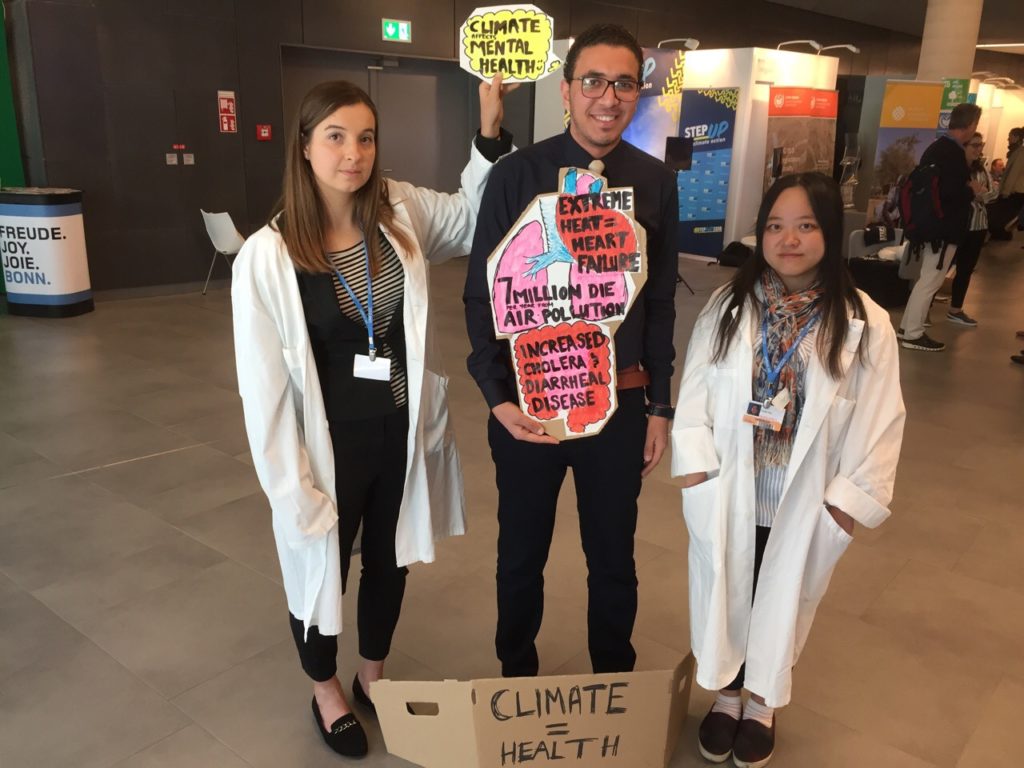We have a unique opportunity to get climate change and health right if we get air pollution right.
The World Health Organization sent this message at the mid-point of the current, fortnight-long Bonn Climate Change Conference, as it released its latest air pollution data.
That data showed that exposure to air pollution kills 7 million people around the world, overwhelmingly in middle- and low-income countries.
Many of the pollutants that are responsible for these deaths are also strong “climate forcing” agents: they add their considerable muscle to carbon dioxide emissions to “force” global temperature rise.
And deaths caused by rising global temperatures and the consequent extreme weather would far surpass the 7 million deaths from air pollution if emissions, primarily caused by the burning of fossil fuels and deforestation, are allowed to rise at their present rate.
“We have a unique opportunity to get these two things, climate change and health, right if we get air pollution right. The health benefits of climate mitigation will pay for the costs of climate mitigation,” said Dr. Diarmid Campbell-Lendrum, WHO Team Lead on Climate Change and Health, at the conference.
Records for extreme weather events are being broken at an unprecedented rate, and that there is a real risk for the world to lose its capacity to sustain human life if the Earth’s climate is further altered by adding ever more heat-trapping greenhouse gases.
“We see the Paris Agreement as a fundamental public health agreement, potentially the most important public health agreement of the century. If we don’t meet the climate challenge, if we don’t bring down greenhouse gas emissions, then we are undermining the environmental determinates of health on which we depend: we undermine water supplies, we undermine our air, we undermine food security,” Dr Campbell-Lendrum said.
“We have a unique opportunity to get these two things, climate change and health, right if we get air pollution right. The health benefits of climate mitigation will pay for the costs of climate mitigation.”
~ Dr. Diarmid Campbell-Lendrum, WHO Team Lead on Climate Change and Health
Youth delegation reminds climate conference of public healths impacts of climate change
The message was also passionately carried by young medical students in the YOUNGO delegation, one of several regular civil society delegations participating in the UNFCCC process.
Their placards emphasise messages that sum up what a large and growing body of research has found: that both air pollution and climate change have impacts on mental and physical health, and that some of the culprits share responsibility for both.

“Climate = Health”: Medical students in the YOUNGO delegation to the climate conference emphasise tightly-knit relationship between public health and climate change
In fact, two main causes of deaths by air pollution have strong links to climate change: indoor cooking with inefficient stoves and dirty solid fuels and kerosene, and the burning of fossil fuels for power, heating and transport which leads to outdoor air pollution.
All these emissions add to the growing climate challenge.
Scientists: Reducing pollutants that cause near-term warming a key component to achieving the Paris Agreement temperature targets
It was also a message conveyed by scientists at the fourth annual Science Policy Dialogue held just before last week’s Climate and Clean Air Coalition Working Group meeting in Toronto, Canada.
The crux of their presentations: that urgent action is needed to reduce the causes of near-term warming if the world is to achieve Paris Agreement’s goal to keep global warming to 1.5 degrees Celsius, and that the path taken to reach that goal matters just as much as achieving it.
Chair and Professor of Climate Sciences at Duke University, Drew Shindel reiterated that short-lived climate pollutants could be reduced with known measures, many at little or negative net social cost. Reducing pollutants that cause near-term warming is also a key component to achieving the Paris Agreement temperature targets and by acting early the world can also achieve important sustainable development benefits.
Read more about the Science Policy Dialogue and the CCAC meeting here
More countries reaping the co-benefits of reducing air pollution
Many countries are increasingly taking up the opportunity to fight climate change and air pollution at the same time: more than 4,300 cities in 108 countries are now included in WHO’s ambient air quality database, making it the world’s most comprehensive database on ambient air pollution.
Four countries– Mexico, Chile, Nigeria and Canada– name black carbon in their nationally-determined contributions (NDCs) to the Paris Agreement, though many more had expressed interest in including short-lived climate pollutants in their NDCs.
However, only Mexico includes an explicit target of a 51 per cent reduction of black carbon emissions on 2013 levels by 2030.
This has already evoked action: WHO’s report highlights Mexico City’s 2016 commitment to cleaner vehicle standards, including a move to soot-free buses and a ban on private diesel cars by 2025; the government of Mexico has also issued new legislation regarding the transport sector requiring improved efficiency and emission standards.
More coverage
UNFCCC: The Paris Agreement is a Health Agreement – WHO
CCAC: World Health Organization: The Paris Climate Agreement is a Health Agreement